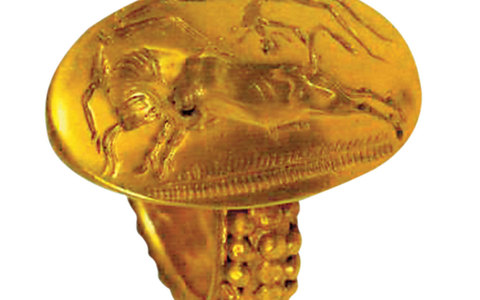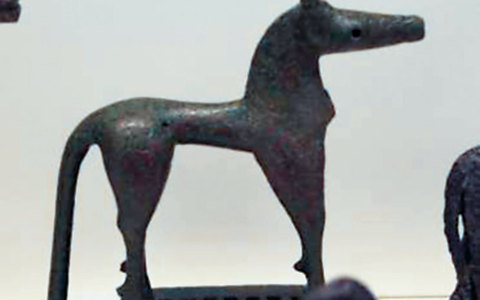Picture: www.tovima.gr
A 42 year old Greek selling ... cigarette lighters and other small objects at a street-stall in Monastiraki is the mastermind of the robbery in the Museum of Ancient Olympia, committed "just like in the movies" in February 2012. All 77 stolen items were found in a bag buried near a village outside Koskinas, about 2 km from Ancient Olympia. The offender and his two accomplices were arrested by Patras police officers, who have been chasing the robbers for the past month. Another two participants in the robbery are still being sought.

The tradesman from Monastiraki who often travelled to Patras wanted to sell a gold ring from the stolen jewellery for 1.5 million euro which was his fatal mistake. He tried to use a small businessman as a mediator, but the police in Patras found out about his plans and they appeared as potential buyers of the ring. After negotiations with police officers, a price of 300,000 euro for the ring was agreed, and a meeting was arranged in a central hotel in the city. After the main protagonist was arrested, he showed the police where the other items were hidden. The investigation will continue until the whole plot is disclosed.

The robbery in the Museum of Ancient Olympia was committed by two masked thieves who stole 77 items, mainly copper objects and ceramics of inestimable value. On 17 February, they broke into the museum and threatened with weapons the employee who guarded it, tied her up and made her show them the whereabouts of a "golden crown" and coins. The stolen items were returned to the museum, where they were identified. From the very beginning, investigators believed that the stolen exhibits were not hidden far away.

Acting Minister of Culture Costas Dzavaras said that the disclosure and arrest of the participants in the robbery as well as the return of the stolen items are an important success achieved as a result of the effective cooperation between the Ministry's departments and the Greek police. He thanked everyone who took part in the investigation and who contributed to the final result. According to Dzavaras, bearing in mind the critical moments the country is experiencing, this success is sending two positive messages inside and outside Greece. It also proves that nationally sensitive public sectors have offices which follow their mission and protect public interest and safety of citizens, as opposed to those who underestimate their work and doubt their effectiveness. The statement ends with the assurance that the treasures of the Greek cultural heritage are kept and protected by capable and qualified civil servants, both in museums and archaeological sites and outside them.